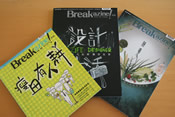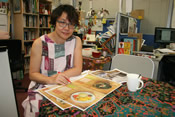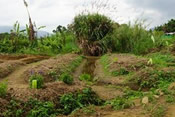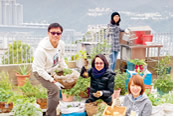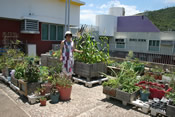
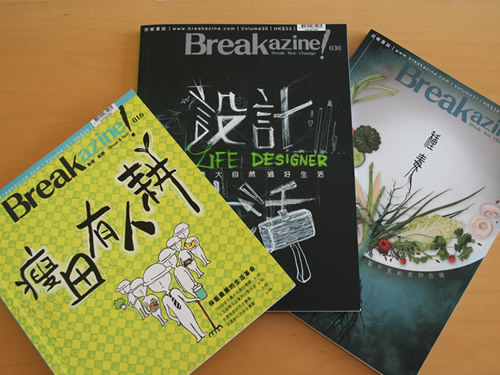 |
| Breakazine! featuring Hong Kong agriculture, land, autonomous living and food safety in its reports. (May Tam/PCD) |
By May Tam (Communications Officer, PCD)
Hong Kong is usually considered to be a busy Asian metropolis or an international finance centre, and is hardly ever associated with agriculture. What is not well known, however, is that agriculture in Hong Kong was a booming industry in the early half of the last century. Rice and vegetable production was able to meet as much as 60% of the city's demand back in the 1960s (1). With runaway urbanisation, economic restructuring and produce imports from Mainland China however, Hong Kong's agriculture gradually dwindled. The once 13,000 hectares of farmland has been reduced to no more than 700 hectares (2), its food self-sufficiency rate (mainly vegetables) fell to only 1.9 % (3) and more than 90% of its food supply is now dependent on imports (4). And so has agriculture disappeared from the collective consciousness. When asked where rice came from, for example, Kong Kids (5) replied that it is scooped out of rice cookers by their domestic helpers. These kids hardly had any idea about rice and farmland at all.
Under these circumstances, a handful of Hong Kong people have committed themselves to eco-agriculture and are advocating Community Supported Agriculture (CSA). Faced with difficulties in raising awareness, mainstream society is asking: does Hong Kong still need agriculture?
In the past five years, agricultural issues have experienced a rare upsurge. Groups of young people initiated a number of social movements advocating the restoration and conservation of local agriculture, including the resistance movement against the demolition of Choi Yuen Village in Shek Kong to make way for the construction of the High Speed Railway and the opposition to the North East New Territories Development Plan, among others. The government submitted to the pressure mounted by this wave of social movements, and put together a consultation paper on Hong Kong's new agricultural policy.
Agriculture seems, for now at least, to have once again become a hot topic in Hong Kong.
How the media is responding to the return of agricultural concerns
The media and its audience have long since moved on from issues concerning agriculture, so how should these concerns be dealt with? Generally speaking, mainstream media ,in keeping with its preference for 'action stories' and for mainstream capitalism, tends to focus on resistance from agricultural revivalists and uses economic worth as the sole means of evaluating agricultural policies. The “agro” value - which involves realising pluralistic and sustainable forms of development, a concept held dear by the activist community - and its role in ecological conservation have little foothold in traditional mass media.
But within the media, there is a handful of people who are willing to lend an ear to Hong Kong's agricultural issues. They are digging deeper into the issues, listening to those wanting to restore local agriculture, interviewing farmers, and seeking to understand the way farmers live and what they advocate. This inevitably leads to an understanding that agriculture is not just an economic practice, but also a lifestyle of wisdom and cultural values, and this understanding is then passed on to their readers.
Bimonthly magazine Breakazine!, whose editorial team was once ignorant to agricultural and farming issues, is a typical example of publications now willing to report on such matters. Its feature Ploughing Barren Fields interviewed a hundred urban farmers to explore the beliefs held by young people who are defending agriculture; Designing Life reflected on how capitalism has fragmented and distorted our lives, and investigated the value of returning to the land and learning from nature; Planting Poisons uses food safety issues as an entry point to reveal the connections between food and agriculture.
A small minority media digging up the realities of agriculture
Breakazine!'s Chief Editor Sandy Lee shared how the editorial team dealt with unfamiliar agricultural issues in a communications workshop under the theme When the Media Encounters Agriculture, at the Communications Workshop on China - Hong Kong - Taiwan Ecological Agriculture and Community Supported Agriculture organized by PCD this March in Hong Kong. In the workshop, she also shared how individuals on her team were transformed as they searched and reported on agricultural issues, and what messages they finally disseminated to their readers.
“[Before covering agricultural issues] I did not see Hong Kong as an agricultural society, but as one run on finance and services, given that Hong Kong has very scarce land resources, which render it unsuitable for engaging in agriculture. Besides, Mainland China is able to supply Hong Kong with food. I also presumed that the new generation started to farm only because it was something green and trendy to do, and that they preferred living a more leisurely life. I had no interest in growing anything then. I could not even keep cactuses alive!”, Sandy told PCD in an interview after the workshop.
To get into each and every social issue they are working on, the five-member editorial team conducted multiple interviews every time. In 2010, when Sandy first encountered agricultural issues, she talked to activist-farmer Chow Sze-chung three times, and tagged along with him to work in the fields, ploughing and sowing to gain first-hand experience.
The whole process left a lasting impression on the editorial team: “When I first talked to them (the young people who recently returned to the fields), they were somewhat resistant to talk to us, lest we would describe them again, as other reporters did, as farming only to escape a mundane city life. They stressed that they were doing it to reflect on “what life was about”, to find a way of living in between the city and the country and to renew their understanding of food autonomy and the meaning of farming and labouring.”
First transform then deliver
After these interviews, Sandy started to reflect on the life of city dwellers and became interested in farming herself. She even partook in it, including going to Mapopo Community Farm to learn about ecological farming and how to make more room for biological co-existence. She later joined a permaculture programme and work-exchange at Li Mountain, Taichung in Taiwan, for farming experience. Last year, she rented a farm lot and became a holiday farmer, and she is now considering farming full time.
Over the last few years, Sandy has been living progressively closer to nature, and she now realises how returning to the fields can bring about a renewed understanding of life. She said, “Food is the basis of life, and our lives are rooted in the land. It is only when people understand how humans are intertwined with land, that the way they see the space occupied by objects shifts accordingly. This is what Designing Life wants to bring about. However, the lives of city dwellers are so fragmented, our relationship with land and the flora it bears, and also with wind and water, is still dominated by consumption and business interests. In the fields, I learned how to co-exist with the multitude, and that is also my spiritual (Christian) pursuit. Humans are the stewards of all things, and caretakers of this Earth.”
Sandy started to understand why Hong Kong needs its own agriculture. She said, “Hong Kong currently imports most of its food from faraway places. This is taking away our food autonomy, and thus food safety issues keep surfacing. What is more profound, as revealed by Planting Poisons, is that food has become a commodity, instead of something that sustains our lives.” Moreover, she also considered that conventional, industrialised agriculture relying on pesticides and chemical fertilisers brings pollution to land and the ecology as well as poor health to human beings. She has learned that agriculture deals with the relationship between people and food as well as that between people and nature.
She also realised that farming is inherently communal. Small farms often cooperate with each other as small communities; their products are the provisions for its neighbouring places, so no one's life could be segregated from others. Because of that, she feels that life as a farmer is real and grounded, as it so depends on collaborating and interacting with each other.
A transformed understanding and re-presenting agriculture
Sandy's personal transformation exemplified that of the rest of the editorial team. After covering the feature stories, they decided to set up a roof farm at their office, using discarded wood pallets and dumped water tanks, dried grass collected and soil nurtured at the back hills; also food scraps from the office canteen. They worked to have the roof totally filled by green power. On the day I visited the roof farm, I saw a bunch of ripening maize and a spiral garden planted according to permaculture principles.
Media people like Sandy are bringing a totally different perspective on agriculture to their readers, unlike the mainstream media, that only zooms in on the resistance displayed by farmers and the economic worthiness of agriculture. Through Breakazine!'s special feature Ploughing Barren Land, the editorial team provokes its readers to reflect on the deep meaning and value of agriculture, and the future development of Hong Kong as a financial centre:
“When bulldozers buried a way of living (agriculture), together with its profound wisdom, culture and contribution to human life, what consequences will our future bear?” (Ploughing Barren Land, from the Foreword, p6.)
“While affixed to the same goal, we are trying out different things at different levels, to tell the government and the people of Hong Kong that the New Territories still have a lot to offer. The city needs villages to provide them with wisdom about life as well as food. Therefore balancing urban-rural development, paying respect to agriculture and making room for different ways of life should be Hong Kong's way forward.” (ditto, p29, citing Chan Kim-ching from the North East New Territories Development Concern Group)
“As Jenny farms, she realises that even though she is not bringing in a lot of income, she would not starve, and inflation has very little effect on her. ‘If you farm, you can eat what you have grown, and can exchange your produce for something else within the community, and need not rely on the two major supermarkets, the Link (
A good beginning: cross fertilisation between the media and agriculture
All this opened up Breakazine!’s readers to a much broader picture of agriculture and its implications. For them to have an in depth understanding of the subject matter, the editorial team, in tandem with other departments of their organisation, orchestrated various activities, and tried to bring their readers on location. This included bringing them to the roof to plant potatoes, composting kitchen waste and tie dying with it, and also conversing directly with farmers.
For Breakazine!, apart from disseminating information and delivering reports, it is also about mobilising social change. Sandy said, “For there to be change, it has to be eye-opening; to be eye-opening, readers have to be present on location, so that there will be interaction.”
Sandy believes that the responsibility of the media is to describe clearly the overall context of a subject, examine its values, and understand the systemic and institutional framework behind it. Given that the mainstream media rarely explore the value of “agro”, Sandy said their job was to “fill in” the gap. Breakazine! is planning to dedicate one issue per year to cover agriculture, ecology, autonomous living, land justice and other related issues.
Agriculture, as a marginalised social issue, has only a small minority media struggling to uncover its deep-seated issues. Nonetheless, this is already a hard-to-come-by beginning. At least, this gives the highly capitalistic and de-ruralised society opportunities to listen to agricultural voices, and opens up possibilities that the media and agriculture would cross fertilise more in the future.
注解:
- CHOW Sung-ming and YIU Chung-yim ed., A Reader on Local Agriculture, 2015, Hong Kong: Land Education Foundation(p27).
- Hong Kong Baptist University Student Union Editorial Committee, Hong Kong Agriculture, What kind of a concept is that?, VJmedia: http://www.vjmedia.com.hk/articles/2015/04/27/105387, 27 April, 2015.
- CHOW Sung-ming and YIU Chung-yim ed., A Reader on Local Agriculture, 2015, Hong Kong: Land Education Foundation(p28).
- ditto, p27.
- Kong Kids is a Hong Kong colloquialism, referring to Hong Kong children who are pampered and over protected by their parents, and have low ability in self-management and in withstanding adversity.
- The Link Management Ltd is owned by private investors. It increased the rent after taking over shopping centres, food markets and cooked food stalls in Hong Kong which were once operated by the government, thus pushing up goods and food prices. It was criticized for adversely affecting these shops and people's livelihood. Since late August 2015, the company has been renamed as ‘Link Real Estate Investment Trust’.


